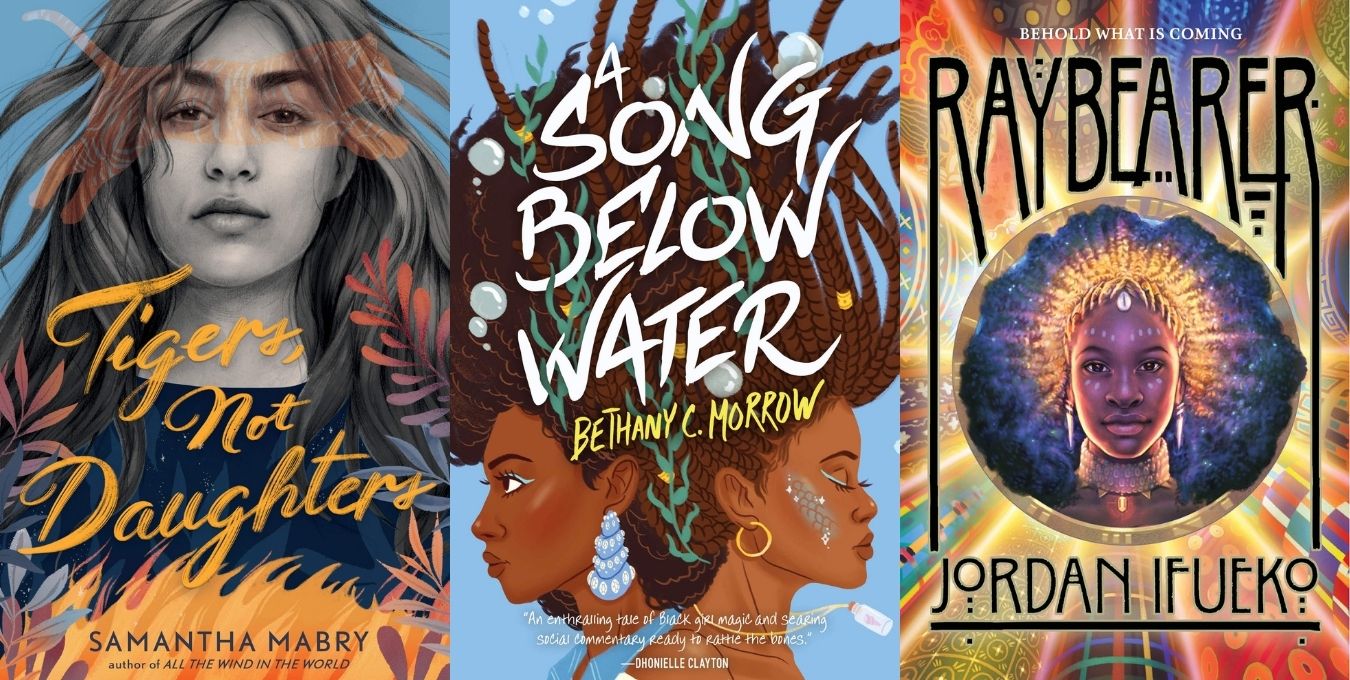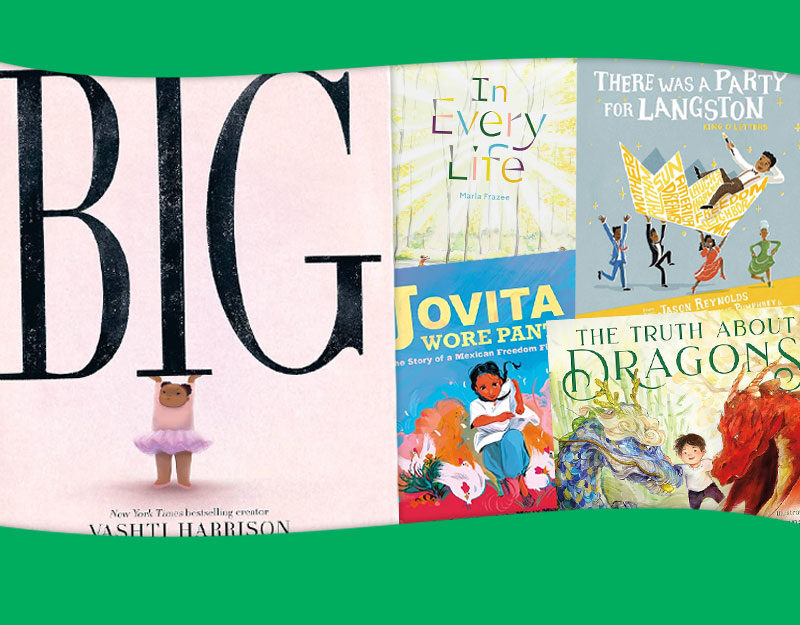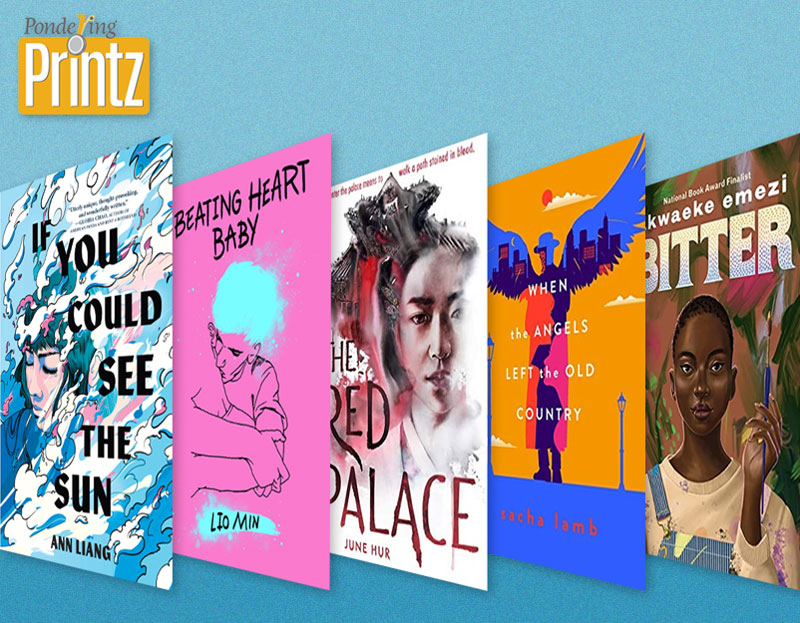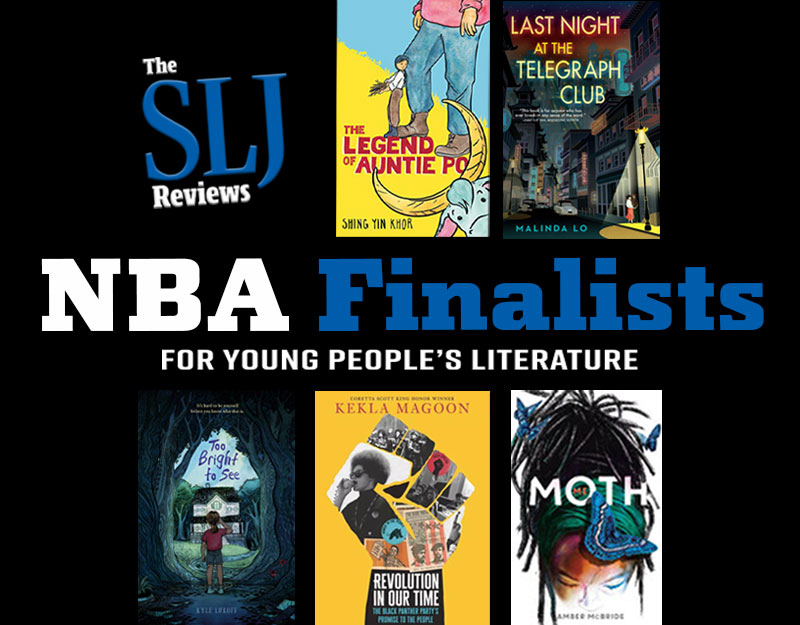Heavy Medal Mock Newbery Finalist #7: Other Words for Home
“We’re in a period of human history where empathy is needed more than ever. As the mother of two little girls, I’m constantly trying to teach them the idea that no one ever grows poor from giving. That sharing what you have does not make what you have worth any less. I guess that’s what this book is really about—the ever-growing need for generosity. And generosity is really just another word for love. So let’s work on giving more love to others as well as to ourselves.”
(from Author’s Note) ― Jasmine Warga,

Jasmine Warga has written an insightful, beautifully written debut middle-grade book. This novel-in-verse follows protagonist Jude as she tries to keep her Muslim values under the intolerant pressure and travels away from home with her pregnant mother. To escape the uncertain violence in Syria, leaving her radical brother, father, and close friend behind.
At first, everything in America seems extremely fast and turbulent. Once she starts school in the U.S. and her new label of “Middle Eastern,” an identity she’s never known before.
ADVERTISEMENT
ADVERTISEMENT
“Americans love labels. They help them know what to expect. Sometimes, though, I think labels stop them from thinking.” (92)
Jude is an insightful narrator. Although it is difficult to read the racism, Jude faces it isn’t shocking. But she also finds compassion, camaraderie and an excellent chance to take part in her school play, to focus on her dream of being an actor.
“Fatima and I both want to be movie stars. Fatima also wants to be a doctor, but I only want to be a movie star.”(8)
Jasmine Warga’s writing was persuasive and, at the same time, so accurate, and candidly elegant. Through Jude’s eyes, Warga blends in several Arabic proverbs, and humorous commentary about aspects of American society that seem unusual to a neophyte, like having a conversation.
“I have learned Americans love to say ‘you know’ and then stop/talking. They force you to fill in the hard parts, the things they are not brave enough to say.” (203)
Readers will discover themselves looking at the life afresh through Jude’s hopeful eyes. Other Words for Home is a selection that is unforgettable, timely and meets the criteria as a worthy Newbery contender.
Filed under: Book Discussion, Heavy Medal Mock
About Annisha Jeffries
Annisha Jeffries is the head of the youth services department at Cleveland Public Library. She was a member of the 2007 ALSC Board and served on several selection committees, including the 2018 Caldecott Committee. A 2000-2001 Spectrum Scholarship recipient, Jeffries is currently the Chair of the Norman A, Sugarman Children's Biography Award. She can be reached at annishamj@gmail.com
ADVERTISEMENT
ADVERTISEMENT
SLJ Blog Network
Happy Poem in Your Pocket Day!
This Q&A is Going Exactly As Planned: A Talk with Tao Nyeu About Her Latest Book
Family Style: Memories of an American from Vietnam | Review
Parsing Religion in Public Schools
Environmental Mystery for Middle Grade Readers, a guest post by Rae Chalmers
ADVERTISEMENT








Thank you Annisha for a beautiful introduction to this book. I am a huge fan of novels in verse and I think Jasmine Warge does a wonderful job bringing to life Jude. Each word is thoughtful and there are so many insightful sentences that really show how perplexed Jude is about how Americans perceive her. I too had written down the sentence above about labels. I think we are so used to putting everyone into boxes and trying to define everyone, that we lose who that person is as a person, not just as a label or fitting into a specific category.Overall, the writing is beautiful and Jude’s story really reflects on the refugee experience.
I thought the use of Arabic proverbs was very well done to deepen the story, particularly the “he cannot give what he does not have” that was used several times to talk about the relationship struggles within Jude’s family.
This part, after I read it, touched me so much I had to close the book for a moment and just let the words sink in:
“There is an Arabic proverb that says:
She makes you feel
like a loaf of freshly baked bread.
It is said about
the nicest
kindest
people.
The type of people
who help you
rise.”
What a beautiful way to combine Arabic and English idioms.
I loved this passage. “The type of people who help you rise” is such a beautiful idea. Jude is fortunate to find several people who are like a freshly baked loaf of bread in her new American life. Her aunt Michelle, Mrs. Ravenswood, the ESL teacher, Mrs. Bloom; somehow, through the snapshots given by the verse format, Warga develops these secondary characters as lifting forces in Jude’s world. Her deft, keen word choice elevates this writing, for me.
Yes I absolutely loved this passage as well!
I really loved this one! As you’ve all pointed out, such great writing and observations of culture. And lots of humor as well as emotion. Here’s one I particularly liked: “ She has that same American boldness that I’ve seen advertised on billboards, like the restaurant down the street that brags about their fully loaded special that comes with everything, but really only includes peppers, onions, and cheese. I’ve decided it is very American to have the audacity to claim that three things add up to everything.”
Yes! I loved this! And noted it as well.
The characterization of Jude is perfect. She straddles the edge between wanting to grow up and being somewhat afraid of it. She seems to both fear and welcome change. Her emotions are also in a constant state of flux. She continually brings up the idea of being happy and sad, excited and scared, etc. all at the same time. For example, she says that she is scared she doesn’t belong in a Middle Eastern restaurant in the middle of America and also that a Middle Eastern restaurant in the middle of America is the only place she belongs (136). These contrasting emotions and juxtapositions create a character that feels authentic. Warga has expertly blended these complex feelings and thoughts to craft a story that is moving and touching.
The metaphor of the overgrown mint on page 28 was a beautiful comparison to the political turmoil happening in Syria. “No one knows how it got there… but everyone is waiting for someone else to do it.” Warga’s use of metaphors is brilliant. From storms to food and more, Jude uses these familiar (to her) ideas to explain the world around her.
I also thoroughly enjoyed all of the Arabic proverbs sprinkled throughout. I thought it added a nice element.
For conveying powerful emotions the form of a novel in verse is a perfect vehicle. Poetry at its essence really conveys emotions in such an engaging way and I love authors who use that format to covey something so essential and real. I think this book really does that, it uses the form of a novel in verse to its upmost effect. The longing for home juxtaposed with the fearfulness mixed excitement over new adventures was palatable in this book. The scenes in the English language learning classroom were especially delightful in conveying this mix of emotions not only for Jude but for the others in her class as well. With that said I will say I would have liked to see other characters a little more fleshed out, the other students and her uncle for example. This is really hard to do with such few words but I feel at time we only caught glimpse of them where ideas where brought up but then dropped that could have added to the overall thematic arc, her uncle’s relationship with her cousin for example was one of those for me that felt a little unfulfilled. Given the point of view of the novel I’m not even sure how she might have added that in but at the same time I think there are pieces of the world around Jude that we missed out on.
Annisha, an excellent introduction! This is one of those books that I could still be persuaded as to where I stand as far as compared to the other contenders we are discussing. I love the poetry and the way the parables are used to let you understand how Jude is thinking. And this writing also takes you deeper and shows you what Jude is feeling. It is not easy to do that in any kind of written work. The words flow beautifully and create wonderful poetry. All that being said, I agree with Rachel about some of the other characters not being as fully developed as I had hoped to see. So…. a beautiful relevant book that will probably fall just short of finding a spot on my final ballot.
Other Words for Home swept me away this year. I remain in awe of what Warga was able to accomplish in the tight space of a novel in verse. My copy of the book is festooned with sticky notes–many notes beginning simply with the word WOW. Jude’s story is timely. She gives us a face and a story to remember when we read the headlines and talk about current events. She is a gift to our readers, even when they may see themselves reflected in her story in ways they never considered. Here are a few of the passages I have noted as evidence of the distinguished nature of this special novel:
Lucky. I am learning how to say it
Over and over again in English.
I am learning how it tastes–
Sweet with promise
And bitter with responsibility.
(p. 168)
Jude feels the disparity. She knows she is sitting in Aunt Michelle’s kitchen, safe and fed while her best friend is missing and her brother is fighting a war for what he believes. This passage is a distillation of that conflicted feeling that I think is just so beautiful.
I love the whole passage when she accompanies her mom to the ultrasound appointment. It shows the halting way Jude and her mom make their way through the American world. Her mom was so delighted to have made an American laugh. I love the way Jude describes that Issa and her mother are funny in different ways. She closes this scene with the poignant, “I’d almost forgotten that it’s possible to cry because of happiness.” (p. 185)
I think an alternate title for this book could be Other Words for Brave. Jude is brave when she can’t know about Issa or Fatima. She is brave for her mother when she translates the American world for her. She is brave when she tries out for a part in the play–hijab and all. I particularly love this passage that both serves to develop Jude and her brother as characters as well as the theme of bravery.
Mrs, Ravenswood helps me with the English words
That I stumble on
And nothing comes out the exact way I want it to.
My voice cracks more than once–
From sadness,
From frustration that I can’t say
what I truly want to say.
I do not have the right words
To describe the space between
My brother’s eyebrows
That wrinkles when he is laughing
Or deep in thought.
But in talking about him,
In saying anything,
Even in my mangled
Fractured English,
I am imagining him,
Imagining and wishing
And hoping
That he is safe.
Hoping,
I’m starting to think,
Might be the bravest thing a person can do.
Here is another passage that stood out to me. Jude is about to audition for the play. I think this is an experience every teen can relate to:
I sometimes worry that there is something
Wrong with me that
I so badly want to know that other people
See me.
But then I think about all the other people,
All the other people who are in this room right now
for the exact same reason,
And realize my want,
My dream,
Is as big and real
and valid as theirs.
(p. 172-173)
“My dream is as big and real and valid as theirs.” Wow. This book shines for me in it’s characters, the succinct, beautiful writing and the bold, important themes it brings up for readers. For me it is one of the most distinguished books of the year and I hope to see it honored with a medal this month.
I really enjoyed this book. Jude is a really well-drawn character; she feels very real. As Alissa noted above, I think her mixed emotions on a lot of things feels very real. I also thought that the descriptions were absolutely beautiful. Even her description of her new winter coat , “The coat is the color of roses/and lined with white fleece./It is as beautiful as it is soft”, is so evocative.
I will say though, that I am curious about everyone else’s take on the poetry. I’m not convinced that this needed to be in verse. Unlike “This Promise of Change”, this verse struck me in most places are being more prose that is broken up into separate lines rather than poetry. But I am open to having my mind changed.
An interesting comment Courtney, I guess for me this really depends on what you define as poetry. For in some ways for me poetry really is just prose broken up into lines, the whole point of that being to add more pauses and thought than a string of words can because of the extreme limits of punctuation. In my mind the separate lines are the distinct style of poetry and in someways by just expressing the words this way you are writing poetry. I don’t think the overall effect would have conveyed the same emotion if it had not had distinct lines. The lines gave the overall disjointed and disconnected experience of the characters coming to a new home. I also think the lines gave it another sense of learning English as a second language with the slight pauses it puts in as our eyes have to move from one line to another. So for me this book is all about emotion and the style of poetry was perfect here because this book packs and emotional punch that I think would have been diluted with prose.
I agree with Courtney that the writing is “more prose that is broken up into separate lines rather than poetry.” That can be an appropriate style, though. The passages Molly cites above show how well it can work. Jude is in a new world, trying to figure things out. The line breaks kind of reflect her hesitance, while at the same time isolating the lines for full effect. I can see where more fluid and/or more firmly structured poetry might not provide the right voice for her.
The passages Molly cites above are good examples. With the longer one in the middle of her comment, for instance: Somehow separating the key words: “imagining” “imagining and wishing” “hoping” “that he is safe” into four lines gives them more prominence. Then bringing back “hoping” and framing it as “the bravest thing” in the next three lines brings it all together.
Yes, Steven, I agree that the way the verse read for me in this novel did sound like the halting way one might think in a new language and the uncertain way one might attempt to express complex thoughts with only a partial vocabulary to draw upon. There is beauty in this effort and the surprising syntax and unusual word choice she uses really stood out for me. The description of the coat that Courtney mentioned is one of those moments.
I love this insight connecting the idea of a poetry novel vs. prose to the connection to learning and expressing oneself in a new language.
For me, what works the best about the novel-in-verse approach is the ability to convey so many more impressions and thoughts without necessitating the connections and explanations that prose often seems to include. Jude has so much to process over the course of the book, and the verse format gives her (and the reader) time to slow down and work though those conflicting feelings and emotions. Wonderfully done.
I appreciate how Molly, Steven, and Rachel pointed out how the line breaks force you to pause and read this differently than if it was simply written in straight prose with no line breaks. I think it is interesting to think of it as the way in which one’s mind might process a new language.
I agree, the writing was excellent. I’m a big fan on books written in orose (although I’ve found them hard to sell to kids) and this was a beautifully written example. I agree with all the positives above and loved Jude. One of my favorite parts was how she used food to feel at home. Cooking, eating, finding a middle eastern restaurant, even loving pizza all helped build her idea of home.
Just an aside, but I’ve found that kids often respond better to novels in verse after experiencing one as a read aloud or even a chapter or two. I always read LOVE THAT DOG to my third graders and just finished THE LAST FIFTH GRADE OF EMERSON ELEMENTARY with my fifth graders, and each experience tends to led to several students diving into more novels in verse on their own.
Good point Katie, I will say for me poetry really is an oral form, in my mind we do it a disservice by just reading it silently, it really was intended to be heard. So I agree that for book like this read aloud or audio is a perfect format.
Thanks Rachel and Katie for the observations about kids responding to novels in verse after hearing them read aloud. I actually just came back to this conversation specifically to add that this book really sang when I read it aloud. Something about the way the words hang in the air really worked for me. I know that I am always in a hurry when I read. I wedge reading into any nook and cranny of time; my TBR pile never gets smaller and there are always so many books worthy of my time. Because of this I think I often do novels in verse a disservice. I read for meaning. I notice beautiful language but it’s like a visual appreciation, rather than a musical one. In Other Words for Home, it wasn’t until I read passages aloud to my Newbery Club that I really noticed the ring of the language. Some people in this discussion have expressed that they found the language to just read like prose broken into lines. That is often my biggest criticism of novels in verse so I truly understand the critique. However this one came alive for me when I read it aloud (try the passage where she accompanies her mom to the ultrasound appointment). It makes me realize I should give other novels in verse this chance to ring before I dismiss them as simple prose chunked into lines.
My question is about the ending. I loved so much about the book. I have trouble with books in verse and I appreciate the idea of it being a slowing and halting way to express yourself for someone learning a language. I just found the last scene being Jude stepping into the spotlight a curious place to end it. There were three poems/chapters at the ending some of which seemed better endings to me. Does someone have an observation that would explain the choice better to me?
Yes, Molly, I too was swept away by this title. My copy has notes all over it! I cannot begin to tell you how many times I stopped to reread a passage or read it aloud. There is such beauty in the telling here. Annisha, you describe Warga’s writing as “candidly elegant” and that is such a perfect description. There is elegance and grace in every sentence. In addition to the Arabic proverb about bread, I also appreciated seeing America through Jude’s eyes:
“America,
like every other place in the world,
is a place where some people sleep
and some people
other people
dream.”
Warga’s writing successfully captures Jude’s longing for home and her desire to belong here. That inner and outer struggle is vividly drawn as she navigates so many new experiences, friendships, and her own mother’s reluctance to settle in. That conflict was fleshed out so perfectly.
My only criticism would be the relationship between Sarah and her father. I wanted a little more information regarding their distance. His relationship with Jude seemed to be at odds with his own relationship with Sarah. It may be nitpicking, but it felt “off” to me.
That said, Other Words for Home is a standout favorite for me.
We’re now closing comments on our HM discussions, as balloting by the HM Committee is underway. Look for new discussions in the January 23rd post as members re-discuss contending titles.